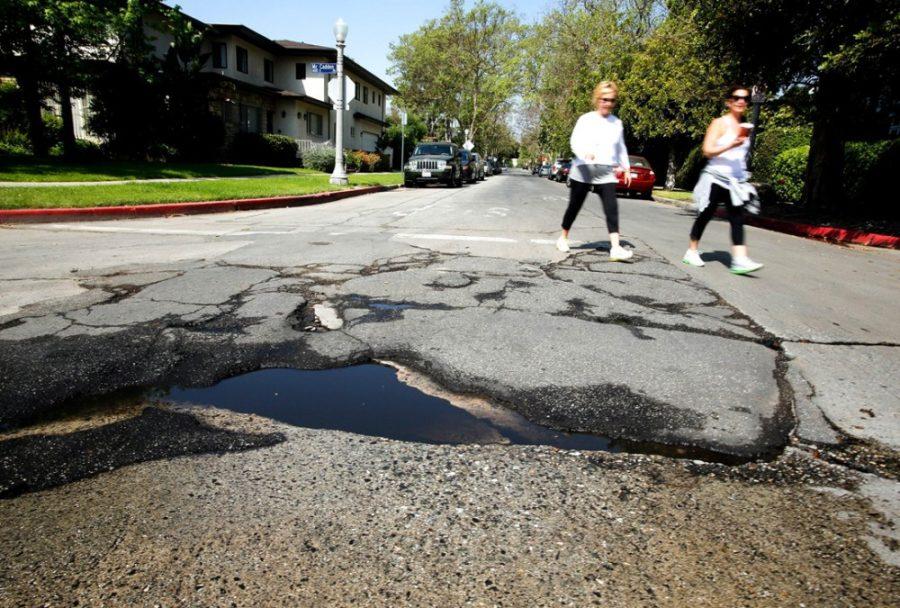PHOENIX — If you’re driving a particularly pockmarked road in Arizona, you may be able to blame the bumpy ride on the state Legislature.
For the past few years, the Legislature has diverted money meant for roads maintenance in order to fund the Arizona Highway Patrol, which cities and counties have said is leaving them less money for needed repairs.
The Highway User Revenue Fund, which is the sum of several taxes and fees including the state’s gas tax and the vehicle license tax, is allotted for the purposes of maintaining roads and bridges and other transportation needs in the state. This fund totals more than $1.2 billion, and last year, about $89 million was taken out of HURF for the Department of Public Safety.
These “sweeps” totaled about $860 million from 2000 to 2014, according to research from the Arizona Association of Counties.
“That maintenance that needs to be done has not been able to be completed, because the funds are not there,” said Ken Strobeck, executive director of the League of Arizona Cities and Towns. He said that over just the past six years, cities have been deprived of more than $100 million that would go to road repairs.
Jen Marson, executive director of the Arizona Association of Counties, said the roads have fallen into disrepair, because counties and cities have not been getting the amount they should have over the past years.
State statute stipulates the way HURF is distributed: 50.5 percent to the State Highway Fund, 19 percent to the counties, 27.5 percent to cities and towns, and 3 percent to cities with populations of more than 300,000.
In 2014, HURF allotted about 17 percent to counties, about 27 percent to cities and towns, and about 45 percent to the State Highway Fund.
Strobeck said the Legislature can get around legal concerns because the part of the Arizona Constitution discussing the state’s gas tax says it can be used to fund state enforcement of transportation laws — or the Highway Patrol.
Marson agreed and said the Legislature has made it work despite the statutory funding requirements.
“They certainly worded it in such a way that they feel comfortable with it,” Marson said.
Proposal for Highway Patrol funding
Last year, the budget approved by the Legislature reduced the amount of HURF money sent to DPS by $30 million from $119 million to $89 million.
Gov. Doug Ducey’s budget proposal released last month would further reduce the HURF dollars for DPS by another $30 million and instead fund the Highway Patrol with a new revenue stream.
The budget would take the Motor Vehicle Registration fee out of the pot that flows into HURF and instead divert those funds directly to DPS. The goal is for the fee to cover about 50 percent of the Highway Patrol’s budget.
John Arnold, director of the Governor’s Office of Strategic Planning and Budgeting, told the Joint Senate and House Appropriations Committee last month that diverting the funds meant for road repairs “has created a conflict between public safety needs and local transportation needs.”
Arnold said this measure hopes to “alleviate some of that conflict.”
The current Motor Vehicle Registration fee is $8 and raises about $35 million. In order to fund half of the Highway Patrol’s budget, it would need to be increased in order to reach $65 million.
Much of the Highway Patrol’s budget has been dependent on the general fund — along with HURF — and the revenue stream hasn’t been reliable, said Jimmy Chavez, president of the Arizona Highway Patrol Association.
Chavez said he supports the governor’s budget decision with the vehicle registration fee, and it was an idea that AHPA talked about with legislators for years. He said this would give the Highway Patrol a reliable funding source.
Chavez said the HURF money being diverted over the years has been necessary in order to keep Highway Patrol numbers at healthy levels.
“The [Highway Patrol] has needed more money” in the last few years, Chavez said. “We’ve basically been kept full. The agency has been receiving enough funding to keep us afloat and keep our manpower above critical levels.”
Marson said the governor’s proposal continues to take money out of counties, because it removes one of the revenue streams flowing into HURF.
“The net effect to counties is essentially the same,” Marson said. “They found a different way of getting that money to DPS.”
Strobeck said this move by Ducey is a step in the right direction.
“We still think that the amount of money that is being diverted is excessive, but it helps put HURF back to roads where they belong,” he said.
Roads in ‘poor’ condition
A 2013 report from the American Society of Civil Engineers concluded that 52 percent of Arizona roads are in poor or mediocre condition. Seven percent of “major roads” in the state are in poor condition.
The report also determined that driving on roads in need of repair costs Arizona drivers an extra $1.16 billion a year in vehicle costs.
Cities and counties contend this is the result of that lack of funding. The state’s gas tax, which currently stands at 18 cents per gallon, is also lower than in most other states.
Ducey’s budget proposal agrees and states that funding the Highway Patrol by “this method places a strain on local transportation efforts.”
Marson said the years of underfunding for roads have taken a toll that may be too much to repair alone.
“We are now at a place in terms of transportation where it’s not about maintenance; it’s becoming about replacement for roads and bridges,” Marson said, “and replacement is always more expensive than maintenance.”









